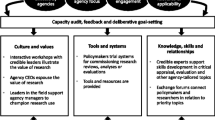Abstract
Background: Capacity building in health promotion has traditionally involved training interventions to support knowledge, skill and resource building for effective practice. However, there is a need to understand how research can be used to support capacity building and practice.
Methods: Findings are based on a parallel case study comprising qualitative analysis of 66 key informant interviews from five provincial heart health projects (Manitoba, Prince Edward Island, Ontario, Saskatchewan, and Newfoundland and Labrador) as part of the Canadian Heart Health Dissemination Project.
Findings: Results indicate research was used primarily to monitor and report results about health promotion capacity and dissemination to stakeholders, and contribute to participatory processes. Respondents noted that research as intervention had an influence on five areas of health promotion capacity and practice: increased heart health promotion knowledge/skills; improved programming, planning and prioritizing; increased motivation for (heart) health promotion initiatives; and cultivation of relationships as well as buy-in.
Interpretation: Research was a complementary capacity-building activity, although it did not directly increase program implementation. These findings contribute to linking researchers, practitioners and community decision-makers in the process of enhancing health promotion practice.
Résumé
Contexte: Le renforcement des capacités de promotion de la santé implique souvent des mesures de formation qui favorisent l’acquisition des connaissances, des habiletés et des ressources nécessaires dans l’exercice de la profession. Toutefois, on ne comprend pas suffisamment comment la recherche peut appuyer le renforcement des capacités et la pratique professionnelle.
Méthode: Nos constatations reposent sur une étude de cas parallèles comprenant une analyse qualitative de 66 entretiens avec les informateurs clés de cinq projets provinciaux sur la santé cardiovasculaire (Manitoba, Île-du-Prince-Édouard, Ontario, Saskatchewan et Terre-Neuve-et- Labrador) dans le cadre d’un projet pancanadien de diffusion d’information sur la santé cardiovasculaire (Canadian Heart Health Dissemination Project).
Constatations: La recherche sert principalement au contrôle et au compte-rendu des résultats sur les capacités de promotion de la santé et sur la diffusion de l’information sanitaire aux intervenants, ainsi qu’à alimenter les processus participatifs. Les répondants ont indiqué que la recherche en tant que mesure d’intervention avait influencé cinq aspects de leurs habiletés et de leurs pratiques de promotion de la santé: elle avait amélioré les connaissances et les habiletés en matière de promotion de la santé cardiovasculaire; amélioré la programmation, la planification et l’établissement des priorités; accru la motivation à mener des initiatives de promotion de la santé (cardiovasculaire); en plus de cultiver les relations et de rallier les intéressés.
Interprétation: La recherche était une activité de renforcement des capacités complémentaire, mais elle n’a pas directement accru la mise en oeuvre des programmes. Ces constatations confirment l’utilité de relier les chercheurs, les praticiens et les décideurs communautaires lorsqu’on veut améliorer les pratiques de promotion de la santé.
Similar content being viewed by others
References
Cameron R, Brown KS, Best JA. The dissemination of chronic disease prevention programs: Linking science and practice. Can J Public Health 1996;87(Suppl 2):S50–S53.
Innvaer G, Trommald M, Oxman A. Health policy-makers’ perceptions of their use of evidence: A systematic review. J Health Serv Res and Policy 2002;7(4):239–44.
Landry R, Amara N, Lamari M. Utilization of social science research knowledge in Canada. Res Policy 2001;30:333–49.
Lavis J, Ross S, Hurley J, Hohenadel J, Stoddart G, Woodward C, Abelson J. Examining the role of health services research in public policymaking. Milbank Q 2002;80(1):125–50.
Feldman JM, Lynch JG. Self-generated validity and other effects of measurement on belief, attitude, intention, and behavior. J Appl Psychol 1988;73(3):421–35.
Steckler A, Goodman RM, Haenlein Alciati M. The impact of National Cancer Institute’s Data-Based Intervention Research program on state health agencies. Health Educ Res Theory Practice 1997;12:199–211.
Cameron R, Walker R, Zanna M. Creating a community smoking profile: An approach to planning and supporting intervention activities. Health Can Society 1994;2(2):217–35.
U.S. Department of Health and Human Services. Building Community Partnerships in Research: Recommendations and Strategies. Executive Summary. Washington, DC, 1998.
Minkler M. Using participatory action research to build healthy communities. Public Health Rep 2000;11:191–97.
Patton MQ. Qualitative Research & Evaluation Methods, 3rd ed. Thousand Oaks, CA: Sage Publications, 2002.
Greenwood DJ, Whyte WF, Harkavy I. Participatory action research as a process and as a goal. Human Relations 1993;46(2):175–91.
Maclure S. Education Re-formed, 2nd ed. London: Hodder & Stoughton, 1990.
Arnstein SR. A ladder of citizen participation. J Am Institute Planners 1969;35:216–24.
Green LW, George MA, Daniel M, Frankish CJ, Herbert CJ, Bowe WR, et al. Study of participatory research in health promotion. Review and recommendations for the development of participatory research in health promotion in Canada. Institute of Health Promotion Research, University of British Columbia, and BC Consortium for Health Promotion Research for the Royal Society of Canada, 1995.
Author information
Authors and Affiliations
Corresponding author
Additional information
On behalf of the CHHDP Investigative Team, Strategic and Research Advisory Groups. Investigative Team: Susan Elliott, Jennifer O’Loughlin, John Eyles, Roy Cameron, Dexter Harvey, Kerry Robinson. Strategic Advisory Group: Deborah Bradley, Catherine Donovan, Brenda Perkins, Scott McLean, Kelly McQuillen, Patti-Jean Naylor, Gilles Paradis, Kim Raine. Research Advisory Group: Lori Ebbesen, Ken Fowler, Ernest Khalema, Viviane Leaune, Murray McKay, Olive Moase, Barb Riley
Rights and permissions
About this article
Cite this article
Haalboom, B.J., Robinson, K.L., Elliott, S.J. et al. Research as Intervention in Heart Health Promotion. Can J Public Health 97, 291–295 (2006). https://doi.org/10.1007/BF03405606
Received:
Accepted:
Published:
Issue Date:
DOI: https://doi.org/10.1007/BF03405606



